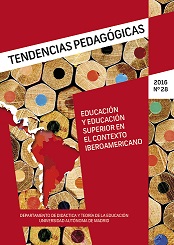Social development and competitiveness improvement: two challenges for education in Latin America
Keywords:
social development, competitiveness, technology, equity, skillsAbstract
The author addresses in this article the direct relationship existing in Latin America between education and development. A region with a cyclical economy in which remains a low level of educational that prevents its fully participation in the knowledge society, ensure a sustainable growth and have a level of competitiveness that would allow the region to grow in a global economy. In short, the author bets on key factors such as: the best selection, training and evaluating teachers, the effective use of ICT in education, to generalize the external evaluation of teachers, centers, and education systems, and carry out a comprehensive strategy for skills, both cognitive and non-cognitive development: skills are the global currency of 21st century.Downloads
References
Banco Mundial (2014). Profesores excelentes: como mejorar el aprendizaje en América Latina y El Caribe. Washington: Banco Mundial.
Cuenca, R., & Pont, B. (2016). El liderazgo escolar: factor clave para reforma educativa. Madrid: Fundación Santillana.
Fernández Enguita, M. (2016). La educación en la encrucijada. Madrid: Fundación Santillana.
Hanushek, E.A., & Woessmann, L. (2012). Schooling, educational achievement, and the Latin American growth puzzle. Journal of Development Economics, 99(2), 497-512. doi: 10.1016/j.jdeveco.2012.06.004.
InspirAction (2012). El escándalo de la desigualdad en América Latine y Caribe. Madrid: Christian Aid.
Trucco, D. (2014). Educación y desigualdad en América Latina. Santiago de Chile: CEPAL.
Jabonero, M. (2014). Más y mejores aprendizajes para todos. El País. Madrid.
Lewkowicz, J. (2010). La maldición de los commodities. Recuperado de http://www.pagina12.com.ar/diario/economia/2-153513- 2010-09-21.html.
OCDE. (2012). PISA 2012. París: OCDE.
OCDE. (2013). Mejores competencias, mejores empleos, mejores condiciones de vida. México D.F: OCDE-Santillana.
OCDE. (2016). Competencias en Iberoamérica: análisis de PISA 2012. Lima: Fundación Santillana-OCDE.
Pedró, F. (2016). La tecnología y la transformación de la educación. Madrid: Fundación Santillana.
Piketty, T. (2014). El capital en el siglo XXI. Madrid: Fondo de Cultura Económica.
Sanz Labrador, I. (2014) Nuevas tendencias en la Evaluación de estudiantes en la educación básica. Ponencia presentada en la I Semana de la Educación organizada por la Fundación Santillana: “Fortalezas y Debilidades de la Educación Básica de Perú”, Lima, Perú. Recuperado de https://www.youtube.com/watch?annotation_id=annotation_4151205083&fe ature=iv&src_vid=ONWfZGdLCxg&v=0nQqAevHjxg.
Sunkel, G. Trucco, D., & Möller, S. (2011). Aprender y enseñar con las TIC en América Latina: potenciales beneficios. Santiago de Chile: CEPAL.
Vegas, E., & Umansky I. (2005). Mejorar la enseñanza y el aprendizaje por medio de incentivos: ¿Qué lecciones nos entregan las reformas educativas de América Latina? Washington: Banco Mundial.
